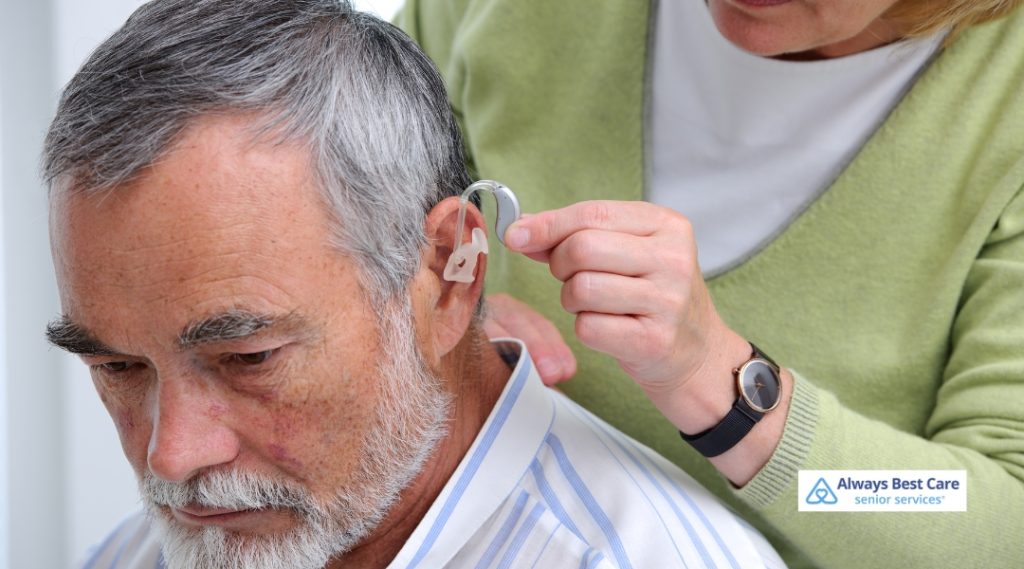Breaking the Silence: A Compassionate Conversation on Hearing Loss with Always Best Care of Asheville

Nobody likes to admit when something’s off, especially as we age.
Yet, if your parent or grandparent keeps saying “What?” or cranks the TV volume sky-high, you might have stumbled into a crossroads:
Is it time to chat about hearing loss?
Trust us at Always Best Care of Asheville; we know this conversation is tricky but oh-so-important for your loved one’s well-being.
What you will learn:
- How to recognize the early signs of hearing loss in aging loved ones and why these cues matter for their well-being.
- Compassionate strategies for starting conversations about hearing loss, including tips to reduce stigma and encourage openness.
- The supportive steps and resources available, from professional evaluations to ongoing caregiver assistance, to help families navigate hearing loss together.
Table of Contents
Spotting Hearing Loss in Loved Ones
Here are some tell-tale hints:
- Struggling to keep up during group chats.
- Asking folks to repeat themselves (again and again).
- Blaming everyone for mumbling.
- Retreating from social gatherings they once loved.
- Cranking up the TV loud enough for neighbors three doors down to hear.

How to Start “The Talk” About Hearing Loss
Broaching hearing loss isn’t just tough; it can be downright awkward. You don’t want your loved one feeling cornered or embarrassed. So what do you do?
Try these tips:
- Pick a calm moment without distractions—skip bringing it up mid-dinner mishap.
- Use “I” statements instead of blaming language.
- For example: “I’ve noticed our phone calls are harder lately” rather than “You never listen.”
- Emphasize care and concern, not criticism.
- Reassure them that lots of people deal with this as they age.
Kicking Stigma and Fear to the Curb
No one jumps at wearing hearing aids. There are worries about independence (“Will I need help now?”) or self-image (“Do I look old?”). But here in Fletcher, NC, at Always Best Care, we’ve seen firsthand how shattering those myths lifts spirits!
Hearing trouble is just another part of aging, like needing reading glasses or stretching before gardening. Today’s devices? They’re smaller and more discreet than ever before!
Encourage your family member by reminding them:
- Lots of seniors use some form of assistive technology.
- Better hearing leads directly to better connections with friends and family.

Steps Forward — Action Over Worry
Ready for action? Here are ways we at Always Best Care can support both you and your loved ones in Fletcher, NC:
- Suggest a Professional Evaluation: Consider consulting an audiologist, not as a punishment, but as a proactive step toward clearer communication.
- Offer Companionship: Sometimes, just being there makes all the difference when nerves hit before an appointment.
- Follow Their Pace: If they need time, give it! Patience goes further than pressure.
Our caregivers go beyond basic check-ins—they remind clients about doctor visits, encourage new routines (like wearing those nifty new aids!), and provide ongoing moral support.
FAQ
Q: How do I know it’s not just selective listening?
A: A gentle clue is whether difficulties show up everywhere, not only during certain subjects! Consistent misunderstandings often point toward actual hearing trouble.
Q: What should I avoid saying during our conversation?
A: Steer clear from blamey remarks like “You’re ignoring me” or jokes that poke fun—it stings more than you’d think! Stick with empathy throughout.
Q: Can caregivers really make life easier if my parent resists help?
A: Absolutely! Our team works patiently alongside clients’ comfort levels until trust grows naturally, and daily life becomes less stressful for everyone involved.
Q: Do most seniors eventually accept their new routine after getting help?
A: Almost always! With encouragement (plus seeing how much simpler things become), resistance melts away faster than expected.

Don’t Wait: Connect with Compassionate Care for Hearing Loss Today!
Contact Always Best Care of Asheville at (828) 676-2939 to learn more and schedule your free consultation.





